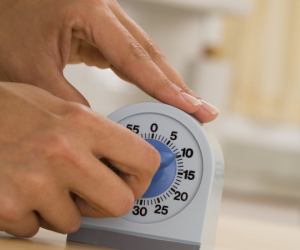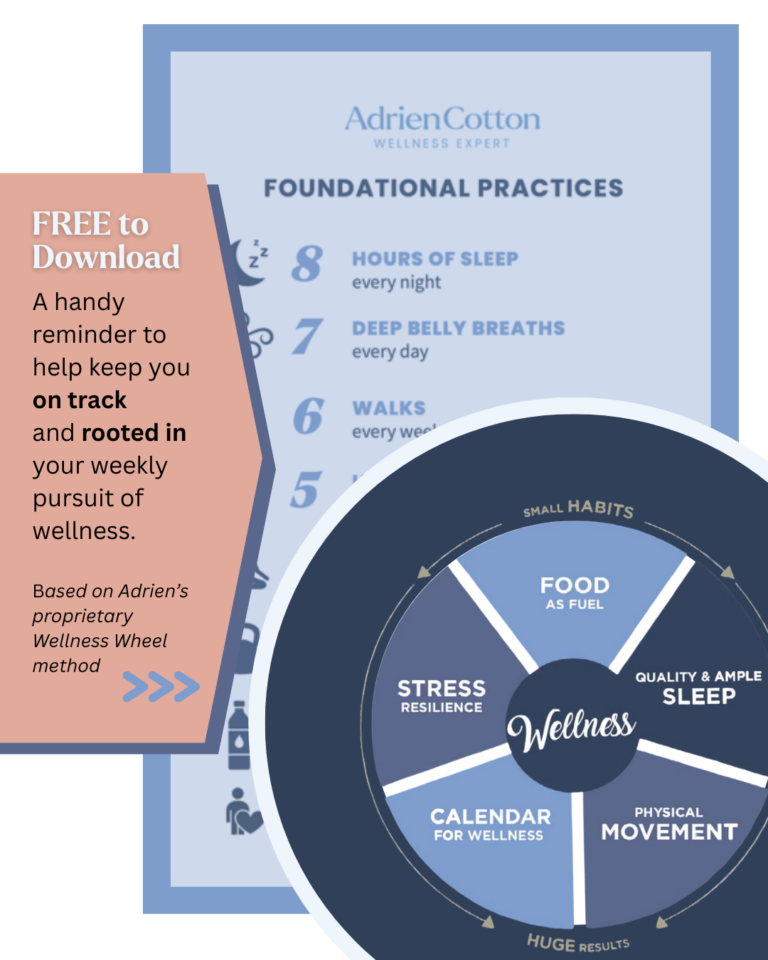My clients will say that sleep is the strategy on which I place the most emphasis. I’m convinced that a consistent sleep schedule is the basis for health, well-being, and a positive mindset. It is at the heart of our wellness, particularly our mental and emotional wellness, and even our ability to lose or maintain our weight!
 I can attest to this from personal experience. During my first career in politics and public affairs, I woke up many times during the night consumed with work. During my perimenopausal years, I would often wake up in the middle of the night drenched in sweat with my brain working overtime. As the mother of twin toddlers at the time, I often found myself stressed and worried in the wee hours of the morning, frequently waking up two to three times a night. Even though sleep was a struggle, instead of making it a priority, I would often chip away at the hours dedicated to sleep to achieve one more checkmark on my never-ending to-do list.
I can attest to this from personal experience. During my first career in politics and public affairs, I woke up many times during the night consumed with work. During my perimenopausal years, I would often wake up in the middle of the night drenched in sweat with my brain working overtime. As the mother of twin toddlers at the time, I often found myself stressed and worried in the wee hours of the morning, frequently waking up two to three times a night. Even though sleep was a struggle, instead of making it a priority, I would often chip away at the hours dedicated to sleep to achieve one more checkmark on my never-ending to-do list.
My lack of sleep was debilitating. I was exhausted, and it began to take a toll on my mental and emotional health. I found it difficult to regulate my emotions and to keep up with my children’s boundless energy and my business as a thriving strength gym. I knew there had to be a better way, so I sought the help of a menopause specialist, basically researching all I could find from experts in the health and wellness industry. Through all of the counsel and research, one common strategy was sleep.
Is Quality or Quantity Better for Sleep?
I’m often asked what matters most when it comes to sleep: quantity or quality. In a perfect world, both would work in tandem with one another and have us blissfully awakening to the sound of songbirds each morning. In reality, women—particularly during perimenopause and menopause—often sacrifice quantity for the sake of work, family, or health issues. But quality sleep is the game changer.
I stress the importance of getting seven to seven-and-a-half hours of sleep each night. In my experience, and again researching the experts, quality will edge out quantity each time. Here’s why: sleep is vitally important to our brain health, memory, and mood. Research has shown that chronic sleep issues can impact our mental health, increasing our chances of depression and anxiety. Lack of sleep can also affect our memory, concentration, and decision-making abilities, which can make all the things we have to do in a day feel mentally exhausting and overwhelming.
Sleep is also when our bodies do most of their recovery and tissue and bone repair. Growth hormone triggers this work to begin during the first half of our sleep session, just after we’ve drifted off into slumber. Growth hormone reaches its highest point during stage-3 NREM (non-rapid eye movement) sleep. We spend about 75% – 80% of our sleep in the NREM stages.
Sleep disruptions during NREM can have adverse effects on our ability to metabolize fat. One study from the Pennsylvania State University noted that participants tended to store more fat when they had less sleep. Sleep deprivation can also affect our hunger cues by altering our production of ghrelin and leptin, the hormones that tell us when we’re hungry and when we’re full. The lack of sleep leaves us feeling more hungry. Add in a drop in the production of growth hormone, a big player in fat metabolism, and we can fall into a cycle of weight gain, and then additional sleep issues due to the weight gain.
This is why the quality of our sleep is super important. We can spend those seven hours in bed, but if we’re tossing and turning from noise distractions, scratchy sheets, a hot room, and a busy mind, we’re not going to get the full benefits of sleep that our body requires.
For women in perimenopause and menopause—with symptoms such as hot flashes, night sweats, depression, and anxiety—sleep disruptions can be a common occurrence. About 46% of women experience difficulty with sleep during their perimenopausal transition. The fluctuation of estrogen causes the thermoregulation function in our brains to be more reactive to temperature shifts. This means hot flashes to warm the body and night sweats to create a cooling effect, which can cause our homeostatic responses to change constantly. These shifts often happen at night, when our bodies regulate our temperature as we sleep. The hormonal changes can also disrupt our sleep/wake cycle, or what is called the circadian rhythm, the body’s internal 24-hour clock that creates mental, behavioral, and physical changes as we move throughout the day.
My first suggestion for creating a balanced sleep routine is to begin with a reverse alarm. This trick I learned from my coach Craig Ballantyne is a game changer. Essentially, set a timer for a period of time ending at bedtime where we practice the very same habits every night. For some this may be just that last 15 minutes before bed. This sets the clock for our body to prepare for sleep. Most who practice this habit start their reverse alarm initially about one hour before bed. The real enthusiasts extend it to earlier in the day.

This type of practice can set the stage for quality sleep. Quality sleep means no waking up in the middle of the night. More importantly it means getting both REM and NREM sleep, which scientists know we need. This means we cycle through the five stages of sleep without interruption.
Quality sleep is the key to all areas of your well-being. Mastering your sleep mindset can be a game-changer! If you need guidance on how to create a sleep and wellness routine, consider signing up for MASTER Menopause NOW! or Small Group Concierge Wellness (in-person or virtually), where I share strategies on how to sleep better and much more.



